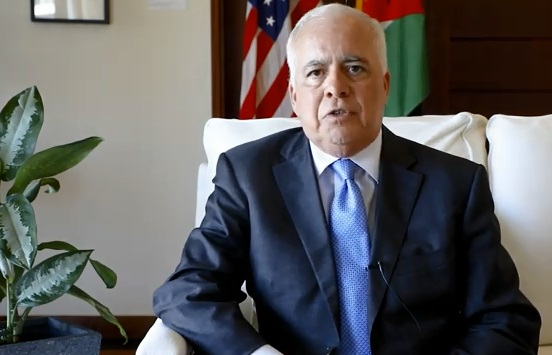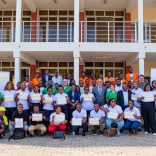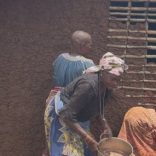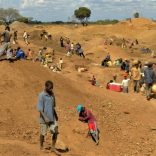Mozambique: Those who violated prisoners’ human rights must be held accountable
Mozambique: Ambassador Hearne’s Op-Ed on World AIDS Day 2020

Photo. U.S. Embassy in Maputo
The world has been hit hard by a global pandemic like no other in recent history, highlighting the reality that we are all more connected than we think. On this World AIDS Day, I want to congratulate all Mozambicans, and especially the Government, for the hard work that has gone into keeping us safe and healthy here in Mozambique.
Every country, every community, and every family have in some way been affected by this new virus, COVID-19. After months of living with COVID-19 among us, we have become all too familiar with the needs of finding emergency medical attention for an elderly relative, grappling with the new normal of wearing masks and maintaining social distance, and the necessary requirements of testing and quarantining to keep our loved ones safe. This global pandemic underscores the importance of a robust public health system, strong enough to treat patients, prevent greater spread of the pandemic, and deal with the unexpected.
I am proud that the U.S. Government provided $19.7 million for COVID-19 related assistance and that we donated 50 ventilators to the Government of Mozambique. However, I’m particularly pleased that Mozambique’s COVID-19 response was built on the foundation of the effective U.S. – Mozambique partnership in the health sector. Over the past sixteen years, the United States’ President’s Emergency Plan for AIDS Relief (PEPFAR) worked hand in hand with local officials to expand HIV testing, conduct contact tracing, provide treatment, and promote prevention. Mozambique’s response to COVID capitalized on the country’s deep experience in these same areas. Our cooperation has helped Mozambique to achieve an impressively low COVID infection and mortality rate, standing out as one of the most resilient countries during the pandemic. Our cooperation is also showing real results in the fight against HIV-AIDS.
After 16 years and more than $3 billion in medical assistance, millions of Mozambicans are on life-saving HIV treatment and have instituted life-changing programs that care for the most vulnerable among us.
HIV, once a death sentence, is now a manageable medical condition. Today, on World AIDS Day, I am proud to say that we are standing on the cusp of inclusive, comprehensive, and sustainable control of HIV/AIDS. This is thanks to the prevention and treatment programs that the U.S. and Mozambican governments have put in place together, and the dedication of our implementing partners.
Any Mozambican who tests positive for HIV immediately receives treatment and has access to medication at healthcare facilities in their communities. These 1.3 million Mozambicans who have been tested and are receiving treatment are teachers, farmers, businesswomen, nurses, and children who are able to contribute to the progress of this great nation. The success is in the numbers. Over the last 10 years, HIV-related deaths have slowed by more than 20 percent.
But we cannot claim complete victory yet. In Mozambique, more than one in 10 adults and more than 200,000 children are still living with HIV. To reduce the prevalence of this disease, the U.S. and Mozambican Governments continue to use modern methods of treatment, but equally important is prevention.
Prevention is critical to controlling this epidemic, particularly among young people. Our DREAMS program supports in nearly every aspect of their lives girls to help prevent them from getting infected with HIV. This year alone, more than 15,000 girls completed the DREAMS program. That’s 15,000 young Mozambicans less vulnerable to contracting HIV.
Ending the HIV/AIDS epidemic requires more than government cooperation. It requires the hard work, dedication, and understanding from all segments of society. I am inspired by the life commitment to this cause by nurses and doctors, teachers, civil society organizations, religious leaders, faith-based organizations, private businesses, and others who advocate for better services and equal treatment for those living with HIV/AIDS. It is because of you that we are able to touch so many lives.
To finally end this epidemic, we must all take a stand against stigma and discrimination and support every one of us to know our status. The people of the United States remain committed to supporting the people of Mozambique in the face of HIV/AIDS, COVID-19, malaria, and other health challenges. Together we can achieve an AIDS-free generation.
Muito obrigado. Estamos Juntos.












Leave a Reply
Be the First to Comment!
You must be logged in to post a comment.
You must be logged in to post a comment.